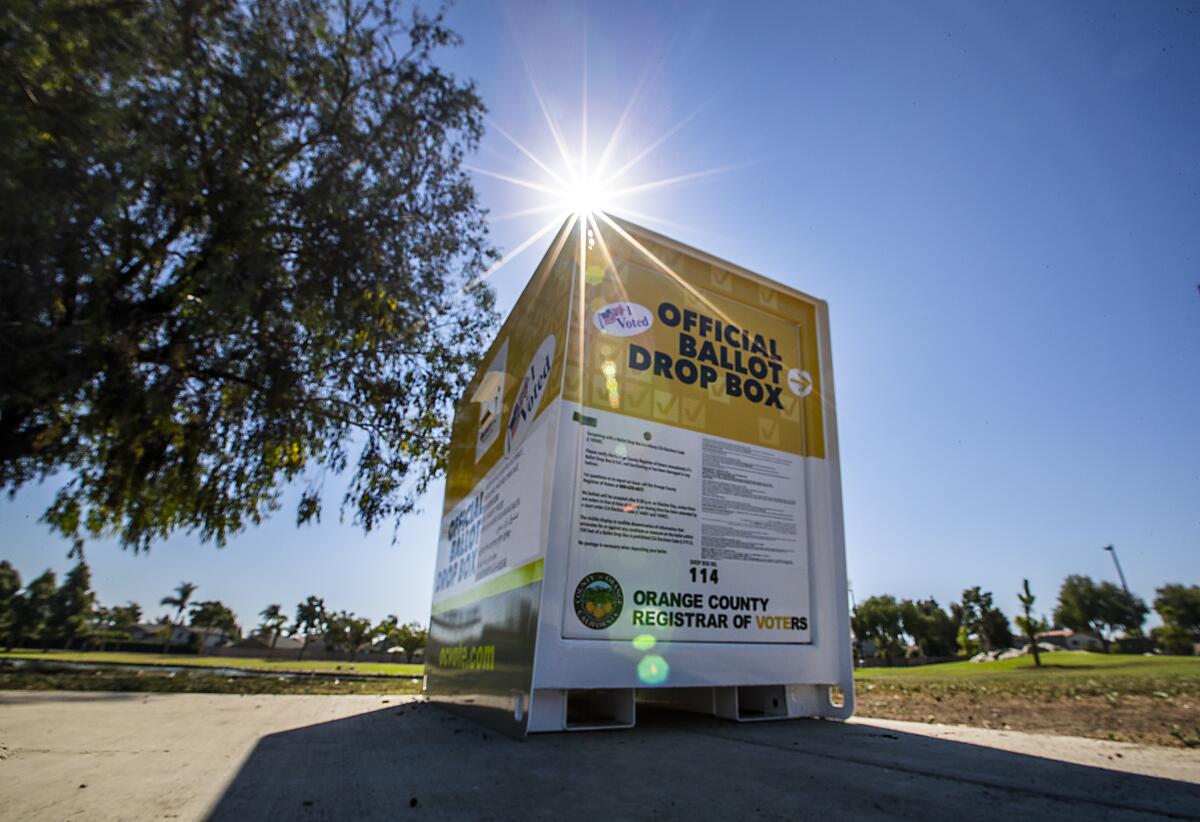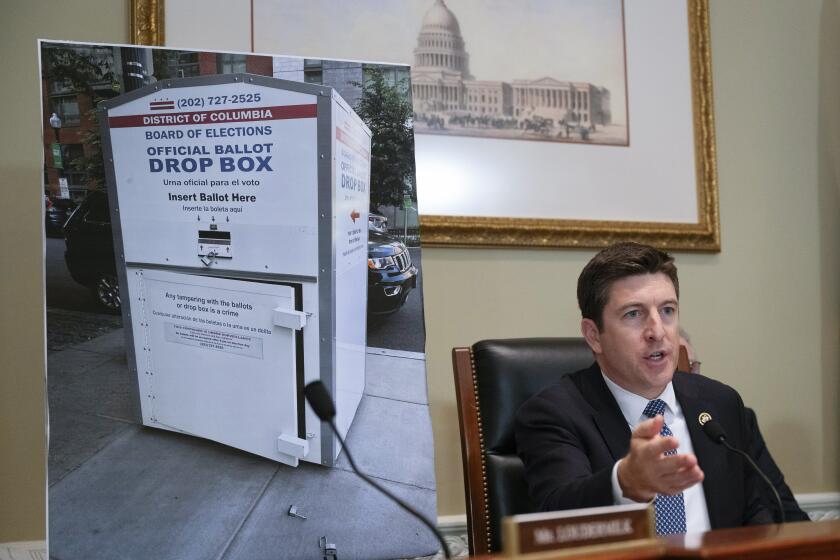Noncitizens banned from voting in federal elections but not some local races

- Share via
Marcela Rosas immigrated to Southern California from the Mexican state of Michoacán more than a decade ago in search of the American dream.
She imagined a life with a house for her three children, educational opportunities and the ability to have a say in her community. There’s one cornerstone of American life that Rosas, 52, hasn’t been able to access: voting.
Without the ability to elect local leaders, Rosas says she feels powerless to push for change that might improve her family’s quality of life, citing issues like rising housing costs and local taxes.
“If I had the opportunity to vote I could choose the people I want to represent me — people who understand my needs and my issues,” she said. “Without the right to vote I feel segregated from my community.”
Rosas is one of thousands living in Santa Ana who could have the chance to vote in local elections by 2028 if city voters in November pass a ballot measure granting noncitizens limited voting power. The measure has drawn intense opposition from locals and organizations who assert that voting is a privilege that should be granted only to citizens.
The battle in Santa Ana comes as former President Trump, now the official GOP presidential nominee, and other Republicans nationwide continue to raise the specter of immigrants voting illegally in the United States to alter the outcome of election results in favor of Democrats — despite robust election surveillance laws and decades of studies that dispute claims of rampant voter fraud.
The issue has come up repeatedly during this week’s Republican National Convention, more recently by former presidential candidate and current Florida Gov. Ron DeSantis, who said on Tuesday that a fundamental GOP party value is “we believe you need to be a citizen in order to vote.”
Noncitizens range from individuals who are permanent residents in the United States to those who are undocumented. It can include those who have work permits, are refugees or are here under Deferred Action for Childhood Arrivals, or DACA. Depending on the jurisdiction, there are at times certain criteria a noncitizen must meet to be able to vote in local elections.
During a news conference in May, U.S. House Speaker Mike Johnson (R-La.) said without evidence that widespread noncitizen voter fraud was “unprecedented and a clear and present danger to the integrity of our election system.”
“Even if you weren’t concerned about the drop boxes and the ballot harvesting of mail-in ballots in 2020 you definitely should be concerned that illegal aliens might be voting in 2024,” he said.
The Republican-led House passed a bill this month to require proof of citizenship for voter registration, even though federal law already bans noncitizens from voting in presidential elections. Those who break the law and register to vote without citizenship status in federal elections can face imprisonment or deportation.
Even so, federal law doesn’t restrict states from setting their own local and statewide election rules, which could include allowing noncitizens to vote in limited local elections, like school board or city council races.
In recent months, the specter of noncitizens voting in the United States -- though rare -- has become a rallying cry for Republicans.
Fewer than two dozen cities have approved local laws that grant voting authority to noncitizens, according to Ron Hayduk, a political science professor at San Francisco State University who has studied and written books about noncitizen voting rights. No state allows noncitizens to vote in statewide elections.
The majority of those cities are in Vermont and Maryland. A handful of jurisdictions in Massachusetts have also passed local noncitizen voting ordinances, though they remain inactive without state approval, Hayduk said. New York City passed a noncitizen voting law in 2021 that a New York judge then struck down as unconstitutional. A federal judge in March rejected a challenge to a Washington, D.C., law allowing noncitizens to vote in local elections.
In California, San Francisco became the first city to grant noncitizens some voting rights via a 2016 ballot measure called Proposition N. The measure, which went into effect in 2018, granted parents of school children the chance to vote in school board races. Oakland voters approved a similar ballot measure in 2022, though the law has not been enacted.
In November, Santa Ana could become the third city that grants noncitizens eligiblity to cast ballots in municipal elections. The ballot measure differs from San Francisco and Oakland’s laws, granting noncitizens voting rights in local elections for mayor, council members and ballot measures.
Proponents say allowing noncitizens to vote is about parity and giving those who pay taxes and contribute to a community a say in their local government. In Santa Ana, which has a population of more than 310,000, there are about 5,600 Vietnamese residents and 64,000 Latinos who are not U.S. citizens, according to Tracy La, the co-founder and executive director of VietRISE.
“There’s a lot of people worrying about the state of our democracy in this country and whether democracy is under attack, but for us what we really care about is how can it be a true democracy if there are so many people in our community that can’t actually vote,” La said.
The rules around who can vote and for what race vary across the country, Hayduk said. Some are limited to school board races, while others apply more generally to citywide elections. Some local jurisdictions require voters to be legal permanent residents or have work permits, while others allow any noncitizen to cast a ballot.
But the idea by Trump and other Republicans that immigrants are voting carte blanche and that Democrats are using those ballots to sway elections is a myth that has been “roundly debunked by study after study,” Hayduk said.
Not only are national and statewide election laws extremely stringent, experts say, but immigrants have a lot to lose putting their names on government records.
In a purple county with several contests that could shape the balance of power in Congress, doubts about elections could keep voters away in November — particularly conservatives.
Many states, like California, allow charter cities to create their own election regulations to enfranchise noncitizen voters, Joshua Douglas, a law professor at the University of Kentucky who has studied local voting rights under state constitutions, explained in an email to The Times.
“Doing so does not violate the U.S. Constitution as there’s nothing in the Constitution that forbids the practice, and it does not violate the state constitution in states with state constitutional language that sets a floor for voter eligibility,” he said, adding that it often boils down to whether state constitutional language authorizes “every citizen” to vote, or “only a citizen.”
A wave of states in recent years have passed constitutional amendments to make it explicit that only citizens can vote, and several others, including Kentucky and North Carolina, will put the question before voters on November’s ballot.
Even in states that allow the practice, there are typically restrictions around how and when noncitizens gain access to the ballot.
To vote in San Francisco school board races, noncitizen voters have to prove they are of legal voting age, a resident of the city and that they are the parent, guardian or caregiver of a school-age child.
San Francisco City Atty. David Chiu, who played an instrumental role in getting the ballot measure passed first as a civil rights lawyer and later during his tenure in the state Assembly, said the law is critical to ensuring all parents “have a say in the direction of their childrens’ education, regardless of citizenship.”
Chiu said there are strict rules governing how noncitizens vote in San Francisco to ensure the program fully protects election integrity. Noncitizen voters receive special ballots that only include school board candidates, and they have to reenroll in the program after every election.
“I am not aware of a single incident of a noncitizen casting an illegal ballot in San Francisco,” Chiu said. “These (voter fraud) claims are simply not based in reality...and I would also say they misunderstand the operational aspects of current voting programs that protect election integrity.”
Chiu later defended Proposition N as city attorney against a lawsuit filed by a conservative legal group seeking to block the law. A San Francisco Superior Court judge initially ruled the law had violated the state Constitution, before an appeals court overturned that decision and allowed the program to continue. The ruling also applied to Oakland’s law, which faced a similar legal challenge.
Attorney and conservative pundit James Lacy, who led the lawsuits in San Francisco and Oakland, filed another lawsuit in May challenging language used in Santa Ana’s ballot measure.
“If we possess anything important in our citizenship, it’s the ability to vote and to participate in the body politic of our localities in our nation,” Lacy said. “When a noncitizen is allowed to vote, it diminishes the value of citizenship. It dilutes the vote of all citizens.”
Experts describe the plan as a legal long shot, but say it could sow doubts about the integrity of a rematch between President Biden and former President Trump.
The impact of the noncitizen voting laws remains unclear.
In 2018, only 65 noncitizen residents registered to vote in San Francisco’s school board election, and 59 turned in ballots, according to the city’s Department of Elections. Those numbers dropped to 36 registered voters in 2020, with 31 ballots cast.
When three San Francisco school board were removed from office in a February 2022 recall election, registered noncitizen voters swelled to 328, and 235 people voted. Registration numbers dropped dramatically for another election that fall. Noncitizen ballots in the last four school board elections accounted for a fraction of the more than 1.3 million total votes cast.
Up until 1926, noncitizen voting was commonplace in most states, Hayduk said. Citizenship mattered less than other societal markers of success, such as race, gender and class, meaning white male landowners, regardless of citizenship status, usually had access to the ballot box.
“This idea that the vote is eternal, it’s always been fixed, is incorrect,” he said. “It’s evolving. Democracy is evolving.”
More to Read
Sign up for Essential California
The most important California stories and recommendations in your inbox every morning.
You may occasionally receive promotional content from the Los Angeles Times.















